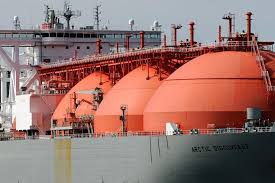After Russia stopped pumping gas through a key supply channel on Monday, Europe’s gas prices spiked, its stock prices fell, and the euro fell, causing another economic shock wave as the region fights to recover from the crisis.
After Russia’s state-controlled Gazprom announced it would stop pumping gas via the Nord Stream 1 pipeline due to a fault, EU governments are pushing through billion-dollar packages to prevent utilities from being crushed by a liquidity crunch and to protect households from skyrocketing energy bills.
In retaliation for Western sanctions against Moscow over its invasion of Ukraine, Europe has accused Russia of turning energy supplies into weapons. Russia attributed the problems with the gas supply to sanctions imposed by “the collective West.”
Numerous European power distributors have already failed, and with the 400% increase in gas prices over the past year, some big generators may also be in danger due to hedging bets or limitations on the price increases they may pass on to consumers.
Mika Lintila, the minister of economic affairs for Finland, compared the energy sector to Lehman Brothers, the fall of which in 2008 signaled the beginning of the global financial crisis.
Finland plans to provide liquidity guarantees to its electricity providers in the amount of 10 billion euros ($10 billion) and 250 billion Swedish crowns ($23 billion).
Finland’s Prime Minister Sanna Marin stated that the government’s scheme is a last-resort financing choice for businesses that would otherwise be in danger of going bankrupt.
Utilities frequently sell power in advance to lock in a price, but they are required to have a “minimum margin” deposit on hand in case of default before supplying the power. The needed margin deposit has risen rapidly along with the rise in power rates, leaving businesses scrambling to find the money to meet the new requirements.
CONSUMER PROTECTION
Germany, which depends more on Russian gas than the majority of EU members, has proposed a multibillion-euro bailout for the power company Uniper. Berlin announced that it would spend a minimum of 65 billion euros to protect consumers and businesses from skyrocketing inflation that was fueled by rising energy prices.
After Russia announced on Friday that a leak in Nord Stream 1 equipment would cause it to be shut longer than the three days of scheduled maintenance last week, the benchmark gas price increased as much as 35% on Monday and was up more than 400% for the year.
European financial markets were reeling from the news. The euro dropped to a 20-year low as European markets tumbled.
Even though Nord Stream 1 was only operating at 20% of its capacity prior to last week’s maintenance interruption, historically it has provided about a third of the gas Russia exported to Europe. Nord Stream 1 runs beneath the Baltic Sea to Germany.
According to Kremlin spokesman Dmitry Peskov, “problems with gas delivery emerged due to the sanctions placed on our nation by Western states, especially Germany and Britain.” “There are no other causes that result in supply issues.”
He also stated that Russia would retaliate if the G7 members set a price restriction on Russian oil, further escalating the energy dispute. There could only be reprisals, he declared.
Russia also uses a pipeline that passes through Ukraine to transport gas to Europe. But because the crisis has also limited such supplies, the EU is scrambling to find substitute supplies to restock gas storage facilities for the winter.
FEAR OF RECESSION
European energy-intensive businesses including those producing aluminum and fertilizers have already reduced their output. Other sectors are dealing with skyrocketing fuel costs on top of chip shortages and shipping bottlenecks.
With prices skyrocketing and interest rates rising, some EU nations have activated emergency procedures that might result in energy rationing and stoke fears of an impending recession.
At the Gastech conference in Milan, Uniper Chief Executive Klaus-Dieter Maubach told reporters, “We cannot rule out that Germany would look at rationing gas.”
Germany is in the second stage of a three-step emergency gas plan and is building liquefied natural gas (LNG) facilities so it can import fuel and increase the number of international providers. There would be some industry rationing in phase three.
As the global economy sucked up supplies in the wake of the epidemic, the market for LNG was already constrained. The Ukraine conflict has increased demand even more.
Norway, a major European producer, has been pumping additional gas into European markets but cannot fill the gap created by Russia.
Energy ministers from EU nations will meet on September 9 to discuss measures to control skyrocketing energy prices, including gas price ceilings and emergency credit lines for market participants, according to a document obtained by reporters.
Even if Germany’s gas reserves were 100% full, according to Klaus Mueller, head of the country’s Federal Network Agency energy regulator, they would run out in two and a half months if Russian gas flows were totally stopped.
Storage facilities in Germany are currently roughly 85% filled, and facilities throughout Europe reached an 80% threshold last week.

















